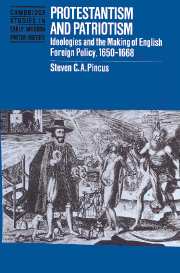Book contents
- Frontmatter
- Contents
- Acknowledgments
- List of abbreviations
- 1 Introduction
- Part I The rod of the Lord: ideology and the outbreak of the First Anglo-Dutch War
- Part II To unite against the common enemy: the 1654 Treaty of Westminster and the end of apocalyptic foreign policy
- Part III Popery, trade, and universal monarchy: ideology and the outbreak of the Second Anglo-Dutch War
- Part IV The Medway, Breda, and the Triple Alliance: the collapse of Anglican Royalist Foreign Policy
- Conclusion
- Bibliography
- Index
- Titles in the series
1 - Introduction
Published online by Cambridge University Press: 01 October 2009
- Frontmatter
- Contents
- Acknowledgments
- List of abbreviations
- 1 Introduction
- Part I The rod of the Lord: ideology and the outbreak of the First Anglo-Dutch War
- Part II To unite against the common enemy: the 1654 Treaty of Westminster and the end of apocalyptic foreign policy
- Part III Popery, trade, and universal monarchy: ideology and the outbreak of the Second Anglo-Dutch War
- Part IV The Medway, Breda, and the Triple Alliance: the collapse of Anglican Royalist Foreign Policy
- Conclusion
- Bibliography
- Index
- Titles in the series
Summary
Seventeenth-century English foreign policy has more often been written off than written about. Domestic constitutional and social developments have dominated the recent historiographical headlines. Foreign policy's retreat from the stage of early modern English history has been so complete that one well-respected historian has recently challenged his readers to “ponder the question of how many English victories over continental powers you can name between the battles of Agincourt (1415) and Blenheim (1704).” The lack of memorable English victories, John Brewer has implied, indicates the relative unimportance of seventeenth-century England on the European scene, and consequently the insignificance of the study of its foreign policy. Brewer's is not a unique assessment. “For three centuries before 1688, the English state had been unable to raise adequate revenues from taxes,” Lawrence Stone has claimed in order to explain away the historiographical neglect of seventeenth-century foreign policy, “as a result of which [England] was no more than a marginal player in the European power game.”
Nevertheless seventeenth-century foreign policy was not always thought to be so marginal. Contemporaries thought of England as one of the great powers of Europe. Agents from Denmark, Sweden, Portugal, Spain, and France stood in line for favors from Oliver Cromwell. “The sea is your own and now all nations greet / with bending sails each vessel of your fleet,” bragged one panegyric to Cromwell, “your power extends as far as winds can blow / or swelling sails upon the globe may go.” This seventeenthcentury national self-image was not soon forgotten.
- Type
- Chapter
- Information
- Protestantism and PatriotismIdeologies and the Making of English Foreign Policy, 1650–1668, pp. 1 - 8Publisher: Cambridge University PressPrint publication year: 1996



